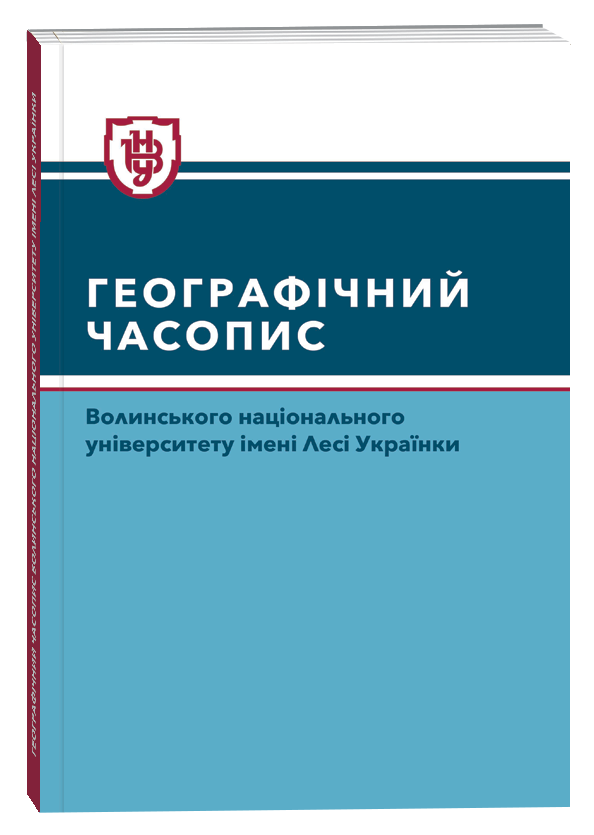LITERARY TOURISM: RESOURCE BASE AND DEVELOPMENT PROSPECTS
DOI:
https://doi.org/10.32782/geochasvnu.2025.5.14Keywords:
literary tourism, cultural tourism, cultural and educational tourism, biosocial resources, historical and cultural heritage, typologyAbstract
The features of literary tourism as a type of cultural and educational tourism, typology, types are considered. Its purpose is to familiarize oneself with landmarks, natural and ethnic features, monuments of history, architecture and modern life of the people, the features of one or another aspect described in a literary work. It can be considered as a system that provides all the opportunities for getting acquainted with the history, literature, customs, spiritual and religious values of a country or a separate region. The features of the development of literary tourism in the world and its resource base in Ukraine are identified. Literary tourism in Ukraine has sufficient potential to become one of the important types of tourism. It is a relevant and promising type of cultural tourism, has its own specific features and plays an important role: it contributes to broadening the horizons, has a clearly expressed educational orientation, satisfies the aesthetic needs of a person. Literary tourism has a beneficial impact on the socio-economic and cultural development of regions, which is manifested in an increase in tourist flows, the creation of additional jobs, the preservation of historical and cultural heritage, etc.
References
Вітрук Н.О. Літературний туризм як перспективний напрям культурно-пізнавального туризму на Рівненщині. Студентський вісник Національного університету водного господарства та природокористування. 2020. № 2 (14). С. 123–125.
Ільїна О.В. Туризм. Рекреаційна географія: Поняття і терміни. Луцьк : Терен, 2004. 104 с.
Лозинський Р., Кучинська І. Спеціалізований (нішевий) туризм: розвиток концепції в українській і зарубіжній науковій літературі. Вісник Львівського університету. Серія географічна. 2018. Вип. 52. С. 170–182.
Поручинська І.В. Літературний туризм як один із видів нішевого туризму. Світові досягнення і сучасні тенденції розвитку туризму та готельно-ресторанного господарства : матеріали ІІІ Міжнародної науково-практичної конференції (Запоріжжя, 14–15 листопада 2024 р.). Запоріжжя, 2024. С. 343–345.
Brown L. Tourism and pilgrimage: Paying homage to literary heroes. International Journal of Tourism Research. 2016. № 2. P. 167–175. DOI: 10.1002/jtr.2043
Brown L., Gentile R. A life as a work of art: literary tourists’ motivations and experiences at il vittoriale degli italiani. European Journal of Tourism, Hospitality and Recreation. 2015. № 2. P. 25–47.
Bu N., Pan S., Kong H., Fu X., Bingna L. Profiling literary tourists: A motivational perspective. Journal of Destination Marketing and Management. 2021. P. 100659. DOI: 10.1016/j. jdmm.2021.100659
Busby G., Klug J. Movie-induced tourism: The challenge of measurement and other issues. Journal of Vacation Marketing. 2001. № 4. P. 316–332.
Butler R. Literature as an influence in shaping the image of tourist destinations: A review and case study. In book: Canadian studies of parks, recreation and foreign lands, 1986. P. 111–132.
Butler R. Literary tourism. Working definitions in literature and tourism. 2022. P. 79–80.
Çevik S. Literary tourism as a field of research over the period 1997–2016. European Journal of Tourism Research. 2020. P. 2407. DOI: 10.54055/ejtr. v24i.409
Fenu C., Pittarello F. Svevo tour: The design and the experimentation of an augmented reality application for engaging visitors of a literary museum. International Journal of Human-Computer Studies. 2018. P. 20–35. DOI: 10.1016/j.ijhcs.2018.01.009
Ferreira A., Alén E., Liberato P., Liberato D. Literary Tourism: a cultural trip? International Conference on Tourism, Technology and Systems, ICOTTS. Buenos Aires, Argentina, 2020. P. 505–515. DOI: 10.1007/978–981–15–2024–2_44
Herbert D. Literary places, tourism and the heritage experience. Annals of Tourism Research. 2001. № 2. P. 312–333. DOI: 10.1016/S0160–7383(00)00048–7
Hoppen A., Brown L., Fyall A. Literary tourism: Opportunities and challenges for the marketing and branding of destinations? Journal of Destination Marketing and Management. 2014. № 1. P. 37–47. DOI: 10.1016/j. jdmm.2013.12.009
Ingram C. et al. Marketing “Literary England” beyond the special interest tourist. Annals of Tourism Research Empirical Insights. 2021. № 2. p. 100018. DOI: 10.1016/j.annale.2021.100018
Kim S.S., Choe J.Y.J., Petrick J.F. The effect of celebrity on brand awareness, perceived quality, brand image, brand loyalty, and destination attachment to a literary festival. Journal of destination marketing and management. 2018. Р. 320–329. DOI: 10.1016/j.jdmm.2018.03.006
Lovell J., Thurgill J. Extending hot authentication: Imagining fantasy space. Annals of Tourism Research. 2021. P. 103138. DOI: 10.1016/j.annals.2020.103138
Quinteiro S., Baleiro R. Key concepts in literature and tourism studies. Handle.net. URL: https://www. researchgate.net/publication/330113803 (дата звернення: 22.01.2025)
Quinteiro S., Carreira V., Rodrigues Gonçalves A. Coimbra as a literary tourism destination: landscapes of literature. International Journal of Culture, Tourism, and Hospitality Research. 2020. № 3. P. 361–372. DOI: 10.1108/ IJCTHR-10–2019–0176
Robertson J.P., Radford L.A. The private uses of quiet grandeur: A meditation on literary pilgrimage. Changing English. 2009. № 2. P. 203–209. DOI: 10.1080/13586840902863186
Robinson M., Andersen H.C. Literature and tourism: Reading and writing tourism texts. London : Continuum, 2002. 295 p.
Rossetti G., Quinn B. Understanding the cultural potential of rural festivals: A conceptual framework of cultural capital development. Journal of Rural Studies. 2021. P. 46–53. DOI: 10.1016/j.jrurstud.2021.05.009
Squire S.J. Literary tourism and sustainable tourism: promoting “Anne of Green Gables” in Prince Edward Island. Journal of Sustainable Tourism. 1996. № 3. P. 119–134. DOI: 10.1080/09669589608667263
Van Deinsen L., De Paepe T. Visualising literary heritage: a viable approach? The case of the Panpoëticon Batavûm (1772–1780). Digital Applications in Archaeology and Cultural Heritage. 2017. P. 49–58. DOI: 10.1016/j.daach.2016.11.003
Wang H., Zhang D. Comparing literary tourism in Mainland China and Taiwan: The Lu Xun Native Place and the Lin Yutang House. Tourism Management. 2017. P. 234–253. DOI: 10.1016/j.tourman.2016.08.008
Yu X., Xu H. Moral gaze at literary places: Experiencing “being the first to worry and the last to enjoy” at Yueyang Tower in China. Tourism Management. 2018. P. 292–302. DOI: 10.1016/j.tourman.2017.10.017







